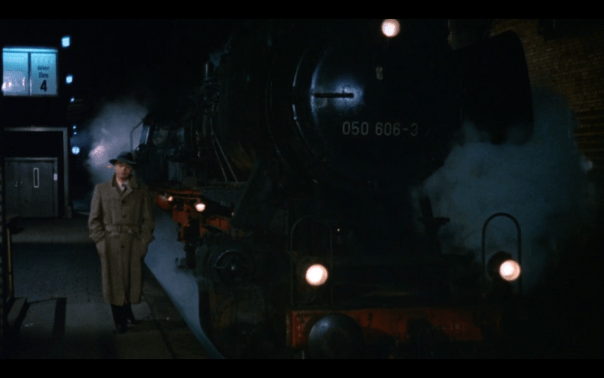THE TENDERNESS OF THE WOLVES / Die Zärtlichkeit der Wölfe (1973), is a film directed by Ulli Lommel but produced by Fassbinder, written by and starring Fassbinder stalwart Kurt Raab, and peopled by everyone who seems to have appeared in previous Fassbinder films, including his lover (El Hedi ben Salem), his current and future wives (Irm Hermann and Ingrid Caven), the stars of THE MERCHANT OF THE FOUR SEASONS (Hans Hirschmüller) and ALI: FEAR EATS THE SOUL (Brigitte Mira); and many others. There is a real sense of Fassbinderlandia about this film and a reminder of the influence of Warhol’s factory on his style of filmmaking. Fassbinder’s own appearance in this film as a fat pimp and small-time crook, sexually and physically confident in spite of his size, crotch thrust out, is a signifier of how confrontational Fassbinder liked to be.
And confrontational this film certainly is. It’s inspired by the same ‘Vampire of Düsseldorf’ that was the basis for Fritz Lang’s M (and there’s an homage to it here, the bit with the young girl in the playground) but set in the aftermath of WWII rather than the interwar years after WW1. Kurt Raab’s look is a combination of Peter Lorre in M and Max Schreck’s in Murnau’s NOSFERATU. THE TENDERNESS OF THE WOLVES brings out the homosexual dimension to the fore. Here the serial killer is gay, in love with a no-good pimp (Jeff Roden), living in an underworld of petty theft, black marketeering and prostitution (both men and women) that brings to mind John Henry Mackay’s THE HUSTLER: THE STORY OF A NAMELESS LOVE FROM FRIEDRICHSTRASSE. Lommell’s film also brings out the vampiric dimension to the fore as Raab’s serial killer, though with no special super-natural powers, likes to bite his victims in the neck and suck their blood before dismembering their bodies and selling their flesh to restaurants through the black market where the customers adore the ‘pork’.
THE TENDERNESS OF THE WOLVES is a very impolitic film, one that I doubt could be made now. Jack Babuscio began his review in Gay News (Gay News No 06, June 3-16th, 1976) by asking: ‘Ulli Lommel’s TENDERNESS OF THE WOLVES (1973) is a film that will certainly set the blood of many Screen Gay readers boiling. Does this mean you?’ (See below and thanks to Andrew Moore for the images).
A creepy gay man luring adolescent runaways to his home with promises of money and employment, then having his way with them (in this film before or after he kills them, with their naked bodies splayed out) must have fed into all kinds of prejudices of homosexual men as predatory paedophiles. It’s a film that would have been a gift to people like Anita Bryant had she been aware of it then. And I wonder to what extent Fassbinder, Lommell or Raab took this into account or whether the social impact of any of these particular narratives and representations on already vulnerable queer communities still living under the repressive Paragraph is something that would have entered their minds. Was it freedom or thoughtlessness?
Frank Noack tells me that, ‘TENDERNESS OF THE WOLVES was attacked in West Germany, by gay activists and gay-friendly straight reviewers, for its sinister portrayal of the gay world, but Fassbinder couldn’t care less. His point, more explicit in PETRA VON KANT and FOX AND HIS FRIENDS, was that gays and lesbians exploit one another as much as straight people do. Neither Fassbinder nor Raab, who has written a deliciously lurid tell-all book right after the maestro’s death, expressed any interest in or sympathy for the gay movement. Because of its explicit male nudity, the film nevertheless won a gay cult following’.
The film’s perspective is that an oppressive world creates its own monsters. Raab’s character (Fritz Haarmann) is arrested by the police under paragraph 175 and made to be a police informant. But his compulsion for young male flesh is his own. I suppose the achievement of this handsome-looking film (Jürgen Jürges first job as dop, deploying a whole arsenal of expressionist devices) is in so well evoking a particular underworld of petty criminals, cheap taverns, dark railways, and dangerous attic flats; in shocking and frightening like a good horror film should, and in arousing sympathy for a queer serial killer.
I suspect Raab’s appearance here had a role in inspiring the skin-head look that would become so prevalent a decade later in London and Berlin.
From the handsomely produced Arrow Box Set of Fassbinder films (vol 1.) chock-a-block with great extras, including interviews with the director, actors, cinematographer.
José Arroyo









